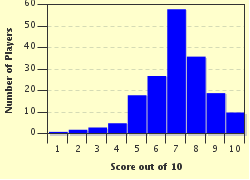Quiz Answer Key and Fun Facts
1. "Steady the 93rd... Damn all that eagerness!" was an order issued by Colonel Colin Campbell, commander of the 93rd Highland Regiment as the Russian cavalry charge collapsed at which battle of the Crimean War?
2. 'England expects that every man will do his duty' was the signal sent to the English fleet by Admiral Horatio Lord Nelson prior to which major naval action against a combined French and Spanish fleet?
3. "Chatfield, there seems to be something wrong with our bloody ships today" was a remark made by Vice-Admiral David Beatty to his flag officer during which major Great War naval action?
4. "There are some who are alive at this moment who will not be alive shortly.
Those who do not wish to go on that journey, we will not send.
As for the others, I expect you to rock their world.
Wipe them out, if that is what they choose.
But if you are ferocious in battle, remember to be magnanimous in victory".
These lines were part of a speech delivered to a British battalion by its Commanding Officer immediately prior to going into action in which campaign?
5. "Nestroque!" This single, mysterious word is reputed to have been the signal issued to the soldiers under the command of Sir Thomas Erpingham at which famous engagement of the Hundred Years' War?
6. "Never send a battalion to take a hill if a regiment is available".
This quote was uttered by which famed US General and future President?
7. When told on the eve of battle that the Persian archers were so numerous their arrows would blot out the sun, soldier Dienekes replied, "Good, then we shall fight in the shade". Of which austere city state was Dienekes a soldier?
8. "I fear all we have done is to awaken a sleeping giant and fill him with a terrible resolve". These words were attributed to which naval commander after his success on a day described as 'a date which will live in infamy'?
9. "Mon centre cède, ma droite recule. Situation excellente, j'attaque". This message was attributed to which alliteratively named French General during the First Battle of the Marne 5th-12th September 1914?
10. "Ah, but that's the English War Office. You and I are both Scottish, and that doesn't apply." was whose response when his piper, Bill Millin, expressed his worry on D-Day, that piping the Commandos ashore was against King's Regulations?
Source: Author
SisterSeagull
This quiz was reviewed by FunTrivia editor
bloomsby before going online.
Any errors found in FunTrivia content are routinely corrected through our feedback system.

